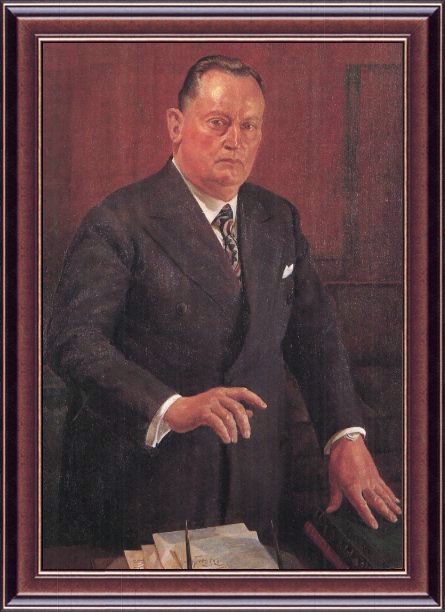
19th PRIME MINISTER
6 JUL 1945 - 13 JUL 1945

Lost leadership ballot to Curtin by just one vote.
Frank Forde was 'always a bridesmaid but never a bride' - or at least only for eight days as Prime Minister. This brief consummation of his political ambitions was typical of a career in which power slipped three times from his fingertips.
As a Labor personality of the period 1917-57, he had the almost mandatory qualifications for leadership in that era: an Irish-Catholic background, humble beginnings, hands-on experience in the workforce, anti-conscription activities in the First World War and early dedication to Labor politics. But the sum of all these things was never quite enough to establish his leadership.
His father, an Irish immigrant, was a railway foreman in the bush town of Mitchell, on the line running west between Roma and Charleville in Queensland. Forde was born there in 1890, as the second of six children. In those days, teaching was one of the few ways in which a bright youngster could move from a restricted background into the wider world. After primary education at the local school, Forde went to Christian Brothers College, Toowoomba, to train for that vocation.
But the confines of the schoolroom palled fairly soon and he joined the Postmaster-General's Department as a telegraphist. Telephones were still a rarity and telegrams were a principal means of communication. Modestly ambitious, he learned enough to become an electrician in the PMG Department and was stationed at Rockhampton.
There he joined the Australian Natives Association, the society devoted to the advancement and welfare of Australia which has been a seed-bed for many politicians of all parties. He became involved in the Queensland Labor Party and in the move to divide Queensland into three separate states.
The anti-conscription campaign was particularly active in Queensland, where Labor held almost continuous power for many years. Forde's involvement in the campaign led to his entry into State Parliament in 1917. He held the seat of Rockhampton until 1922, when he resigned to contest the federal seat of Capricornia. His victory began 24 years in the Commonwealth Parliament.
Forde appears to have been a ‘good party man'- intelligent, hardworking, loyal and dedicated - the type of man who climbs soberly and steadily up the ladder in any profession. When Labor regained power in 1929, Scullin appointed him Minister for Trade. He performed impressively enough for the party to elect him deputy leader in 1932.
When Scullin resigned in 1935, Forde could reasonably have expected to follow him as leader. But supporters of John Curtin nominated him for the post and Curtin defeated Forde by only one vote.
Forde swallowed his disappointment and continued to work faithfully for the good of the party. As a man who had no eccentricities, no special charisma and no particular physical distinction, he rarely attracted any attention from journalists or cartoonists. He presented the image of a good, average Australian, contentedly married with four children. Nevertheless Curtin and the party thought highly enough of him for him to become deputy leader and Deputy Prime Minister when Labor returned to power in October 1941.
Curtin also appointed him Minister for the Army. For the rest of the Second World War, he accepted this arduous responsibility with dedication and efficiency. He was a loyal supporter of Curtin's turning away from Britain to America and of General Douglas MacArthur as the Supreme Commander of Allied forces in the south-west Pacific.
When Curtin died, the Governor-General immediately commissioned Forde as Prime Minister until the party decided on a new leader. Forde was nominated but, after only eight days in power, he lost to Ben Chifley. He continued as Minister for the Army until he lost his seat in the 1946 elections, probably because impatient servicemen blamed him for delays in demobilisation. The party rewarded his long efforts by appointing him High Commissioner to Canada, where he served until 1953.
In 1955 he made a political comeback by winning a seat in the Queensland Parliament and gaining so much party support that there was a move to depose Premier Vince Gair and replace him with Forde. All that Forde had to do was to hold on to his seat in the 1957 state elections - but he lost again, and again by one vote, to a Country Party member.
After this 'third time unlucky' he retired from politics. He made a brief reappearance in the public eye in 1964, when Menzies sent him to the USA to represent Australia at the funeral of Douglas MacArthur, but otherwise he lived out the rest of his 92 years in relative obscurity.

http://www.oocities.org/CapitolHill/5557/forde.html
This page last updated on 01 Feb 01
© Robertsbridge and Langlen
The following advertising was randomly placed by GeoCities,
and does not necessarily reflect
my personal interests, attitudes, opinions, or endorsements.
But it DOES keep those annoying pop-up ads off of my pages!
THANK YOU FOR STOPPING BY!